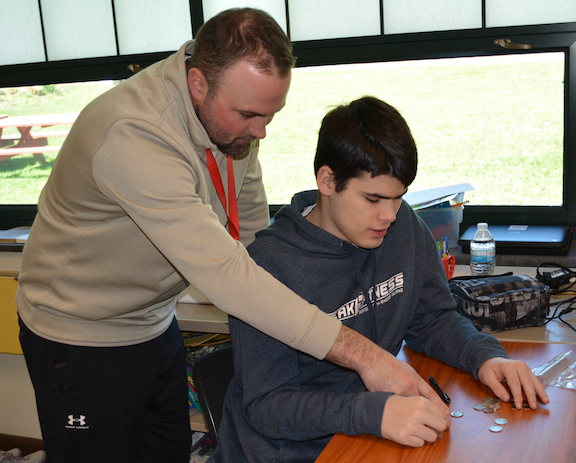PPS Navigation

Glossary of Special Education Terms and Acronyms
Accommodations: Supports and services that the student may require to successfully demonstrate learning and that do not change the expectations for performance. They simply offer support for challenges. Examples include extra time for assignments or tests, the use of e-books, alternative assessment formats, etc.
Alternate Assessment: Designed for students deemed eligible with significant cognitive disabilities. Alternate assessments are created around the unique needs of students that take into account motor, hearing, vision, and other physical disabilities as well as cognitive disabilities.
Assistive Technology (AT): Any device, equipment, or software that helps students learn, communicate, and function better in school to access their instruction. AT ranges from simple tools (like highlighters) to high-tech software (like apps that read text aloud).
Behavior Intervention Plan (BIP): A plan designed to proactively teach and reinforce positive behavior. Typically, the plan uses strategies to prevent and address behavior that gets in the way of learning. It may also have support and aids for the student. A BIP is often included as part of an IEP. To get a BIP, a student must have a functional behavioral assessment
Case Manager: Usually a special education teacher or another member of the IEP team who is the parent/guardian’s point of contact for the IEP. The case manager is responsible for making sure your child’s special education services and supports are in place and that those services and supports are being provided in the way that is described in your child’s plan.
Common Core Standards: A set of federal educational standards for teaching and testing English and mathematics between kindergarten and 12th grade.
Essential Elements: Used to inform instructional planning and goal setting for students on the Alternate Assessment.
Evaluation: Tests and other assessment procedures, including a review of information, that are used to decide whether your child is eligible, or continues to be eligible (reevaluation) for special education services and what services your child may need. The evaluation should be individualized for each student and be conducted in all areas of suspected disability.
Evaluation Team (ET): The team of qualified professionals, including parents/guardians, who determined the child eligible for special education.
Extended School Year (ESY): Special education and related services that are provided to an eligible student in accordance with the student's individualized education program (IEP); beyond the normal school year; and/or school day and at no cost to parents/guardians. The IEP Team determines the need for ESY services for a student on an individual basis.
Functional Behavior Assessment (FBA): An FBA is an evaluation focused on behavior that studies a student’s patterns of maladaptive behavior and its functions (i.e., purpose the behavior serves for the child). The resulting plan is called a Behavior Intervention Plan (BIP).
Free Appropriate Public Education (FAPE): Special education and related services that are provided at public expense, under public supervision and direction, and without charge; meet state and federal requirements, include preschool, elementary school, or secondary school education; and are provided according to an individualized education program (IEP).
Individualized Education Plan (IEP): A written plan that details the specially designed instruction and related services that must be provided to each student who receives special education services. Parents/guardians and school personnel work together to write the IEP. It must be reviewed and revised every year.
Least Restrictive Environment (LRE): A student with a disability must, to the maximum extent appropriate, be educated with students who are nondisabled in the general education class in the school that they would attend if the student did not have a disability that required special education and related services. A student with a disability should not be removed from the general education setting unless the nature and severity of the student's disability are such that education in the general class with the use of supplemental aids and services cannot be achieved satisfactorily.
Local Educational Agency (LEA): The public schools operate as independent school districts in accordance with statutes, regulations, and policies of the Rhode Island State Department of Education. The LEA representative often serves as the chairperson of a special education meeting and has the authority to commit district services and funds. The LEA representative role in Portsmouth is filled by the following people: The Early Childhood Coordinator, the Student Support Specialist (Elementary), the Special Education Coordinator (Middle and High School), Building Administrators and the Director of Pupil Personnel Services.
Manifestation Determination: A meeting of relevant members of the IEP team for students with disabilities who have 10 cumulative school days of removal due to a violation of a code of student conduct within a school year. A Manifestation Determination for every subsequent school removal is required where the IEP team must meet, consider relevant information in the student’s file, including the child’s IEP, teacher observations, and relevant information provided by the child’s parent(s)/guardians, and then determine: (1) if the child’s conduct was caused by or directly and substantially related to the child’s disability; OR (2) if the conduct was a direct result of the school’s failure to implement the IEP. If the answer to either of these questions is yes, the conduct is considered to be a manifestation of the child’s disability.
Modifications: Modifications, unlike accommodations, change the level of instruction provided or tested. Modifications create a different standard for the student receiving them and change what a student is taught or expected to do in school as a result of a disability.
Multi-Tiered System of Supports (MTSS): A multi-tiered system of supports, (MTSS) is a framework for school improvement. It is a multi-tiered equitable system of support based on a high-quality curriculum, effective instruction and differentiation (Tier 1), evidence-based group interventions (Tier 2), and intensive evidence-based interventions (Tier 3).
Office of Civil Rights (OCR): A branch of the US Department of Education that enforces several federal civil rights laws (such as, Section 504) that prohibit discrimination in programs or activities that receive federal financial assistance. These laws prohibit discrimination on the basis of race, national origin, gender, disability, and age.
Office of Special Education Programs (OSEP): A division of the U.S. Department of Education dedicated to improving results for students with disabilities ages birth through 21, OSEP provides leadership and financial support to assist states and local districts. OSEP administers the Individuals with Disabilities Education Improvement Act (IDEA).
Parent / Guardian / Educational Surrogate: IDEA 2004 expands the definition of parent to include: natural, adoptive or foster parents/guardians; guardians (unless the child is a ward of the state); individuals acting in the place of natural or adoptive parents/guardians such as grandparents/guardians, stepparents/guardians, other relatives with whom the child lives; individuals responsible for the child’s welfare; and assigned surrogates.
Prior Written Notice (PWN): An explanation of why the school district proposes or refuses to take an action. The school must inform parents/guardians of any actions proposed or refused by the special education team, a description of other options that the School-Based Team considered, an explanation of why those options were rejected, including assessment information used to make the decision. All this must be done in writing. The proposed action cannot be implemented until 10 school days from the date the parent receives the notice unless the parent and the district mutually agree to an earlier implementation date.
Related Services: Transportation, developmental, corrective, and other supportive services that a student with disabilities requires in order to benefit from special education. Services may include speech pathology and audiology, psychological services, physical and occupational therapy, counseling services, medical services for diagnostic or evaluation purposes, school health services, social work services, and parent counseling and training.
Rhode Island Early Learning and Development Standards (RIELDS): Provide early childhood professionals with a common understanding of what children should know and be able to do as they exit preschool programs and enter kindergarten.
Rhode Island’s Alternate Assessment, Dynamic Learning Maps (DLM): Assessments for students with the most significant cognitive disabilities for whom general state assessments are not appropriate, even with accommodations. DLM assessments offer these students a way to show what they know and can do in English language arts, mathematics, and science.
Rhode Island Department of Education (RIDE): The State agency that oversees the elementary and secondary education system from pre-Kindergarten through high school. The mission of RIDE is to prepare every Rhode Island student for success in college, careers, and life.
Social Emotional Learning (SEL): The process through which students acquire and apply the knowledge, skills, and attitudes to develop healthy identities, manage emotions and achieve personal and collective goals, feel and show empathy for others, establish and maintain supportive relationships, and make responsible and caring decisions.
Special Education: Specially designed instruction, at no cost to the parent, to meet the unique needs of a child with a disability, whose educational needs cannot be met with accommodations and/or modifications in the general education setting.
Specially Designed Instruction: Instruction that has been adapted in content, methodology or delivery as appropriate to the individual needs of each eligible student.
Transition: The process and planning for a student moving from elementary school to middle school, middle school to high school, then high school to adult life.
